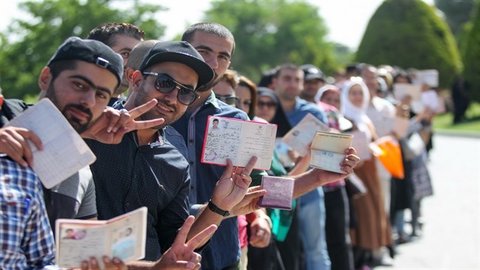Some 63,500 polling stations opened at 08:00 local time (0330 GMT) Friday across the country where more than 56 million were eligible to cast their ballots.
Some 350,000 members of the security forces were deployed around the country to protect the election, national TV reported. The Interior Ministry said at mid-day that it had no reports of electoral offences so far.
There was a festive atmosphere in Tehran where Rouhani, a 68-year-old moderate cleric, was mobbed by cheering supporters as he cast his ballot in a mosque in the city center.
“The enthusiastic participation of Iranians in the election reinforces our national power and security,” he said, as polling stations reported queues were far bigger than in last year’s parliamentary elections.
He said the election was important “for Iran’s future role in the region and the world”.
“Whoever wins the election, we should help him fulfill this important and serious duty,” IRNA quoted him as saying after voting.
Rouhani has sought to frame the vote as a choice between greater civil liberties and “extremism”.
But he faces stiff competition from Raeisi, 56, who has positioned himself as a defender of the poor.
“I will respect the outcome of the vote of the people and the result will be respected by me and all the people,” Raeisi said as he cast his ballot in southern Tehran.
He has targeted working-class voters, promising to triple cash handouts to the poor.
In the last election, Rouhani won more than three times as many votes as his closest challenger. But this time the outcome promises to be much closer, as other conservative rivals have backed out and thrown their support behind Raeisi.
Rouhani’s central achievement was a deal with six world powers led by the United States that eased crippling economic sanctions in exchange for curbs to Iran’s nuclear program.
This year’s presidential race also features two low-key contenders – former deputy Judiciary chief and member of Iran’s Expediency Council, Mostafa Mirsalim, and former vice president, Mostafa Hashemi-Taba.
Two more consequential candidates, Tehran Mayor Mohammad Baqer Qalibaf and Vice President Is’haq Jahangiri, dropped out in the final days of campaigning in favor of Raeisi and Rouhani, respectively.
Massive turnout
Leader of the Islamic Revolution Ayatollah Seyyed Ali Khamenei was among the first to cast his ballot, calling on Iranians to turn out in big numbers.
Speaking after casting his vote, the Leader said, “I thank God Almighty for the blessing of democracy and people’s participation in the election. This is a great blessing.”
“Praise be to God, our people are thankful for this blessing. You see they are participating and my advice is that more and more people participate and come to the polls at the earliest time possible. For good deeds should be done early.”
Ayatollah Khamenei described the 2017 elections as very important, saying the destiny of the country is in the hands of the masses.
“The destiny of the country is in the hands of the people who choose the chief executive. They should heed the importance of this task," Ayatollah Khamenei added.
Outside Iran, a researcher at Victoria University of Wellington in New Zealand became the first Iranian to cast his ballot. Voting was also underway in the cities of Auckland, Christchurch and Dunedin.
Across Asia, Europe and the Americas, Iranian expatriates were casting their ballots in various countries, but Canada did not allow the Islamic Republic to set up polling stations on its territory.
Based on Iran’s election law, if no candidate manages to secure over 50 percent of the votes, a runoff will take place a week later.
Local elections
Besides picking a president, Iranians also voted to choose members of the country’s City and Village Councils.
“The City and Village Council Elections are also important as they elect those who are in charge of urban and rural services, namely, the everyday issues involving the people,” the Leader said.
Intelligence Minister Mahmoud Alavi said no security threat had been observed so far, adding the “slightest anti-security move” would be dealt with accordingly.
“In the past, anti-security and counter-revolutionary currents were trying to somehow create threats, but this time around, we are witnessing a decline in this regard,” he said.


Your Comment